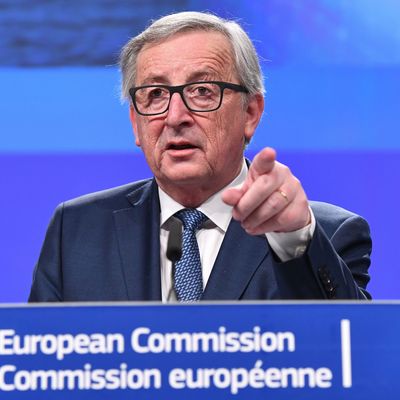
Donald Trump announced Thursday that he will be slapping a 25 percent tariff on imported steel and a 10 percent tariff on imported aluminum. He did not specify whether these duties would apply to imports from all foreign countries without exception. And his administration was unable to clarify this point:
The cause of Wilbur Ross’s equivocation was simple: The president unveiled his tariff policy before allowing any White House staff, government lawyers — or officials at the departments of State, Treasury, or Defense — an opportunity to weigh in on the measure, or hammer out its details.
Instead, Trump (reportedly) decided to publicize a protectionist policy that would rankle all of America’s allies on a whim Wednesday night, a decision “born out of anger at other simmering issues,” according to two anonymous officials who spoke with NBC News.
Critics of Trump’s move predicted it would result in a trade war that would hurt American consumers and workers. Some administration officials sought to downplay that risk. But on Friday morning, Trump clarified that he not only expected a trade war, but wanted one.
Meanwhile, on the other side of the Atlantic, European leaders were doing everything in their power to persuade the president that he was mistaken — that this trade war would be bad, and very difficult to win.
Jean-Claude Juncker, European Commission president, told the German press Tuesday that should Trump make good on his protectionist promise, the European Union would slap retaliatory tariffs on goods produced in the home states of top Republican officials — including the bourbon prepared in Mitch McConnell’s backyard and Harley-Davidson motorcycles manufactured in Paul Ryan’s.
“None of this is reasonable, but reason is a sentiment that is very unevenly distributed in this world,” Juncker said. “We are here and they will get to know us.” (Apparently, trade war really gets Jean-Claude Juncker’s catchphrase juices flowing.)
France’s economic minister Bruno Le Maire expressed a degree of sympathy for America’s predicament — French steel has also suffered from the massive subsidies and “dumping” practices that certain countries (read: China) use to prop up their domestic production. But Le Maire insisted that “a trade war between Europe and the United States will only result in losers.”
Angela Merkel’s office said that the German chancellor “rejects” the tariffs, and believes that such a policy could trigger a global trade war. The United States is the biggest importer of Germany’s rolled steel products, and the second-biggest consumer of the European Union’s.
But bitter opposition to Trump’s policy wasn’t limited to the EU. Canada, which runs a steel trade surplus with the United States — and is the biggest buyer of U.S. steel — promised to “take responsive measures to defend its trade interests and workers.”
And reviews from China were no less withering: “I feel Trump’s decision is stupid,” Li Xinchuang, vice-chairman of the China Iron and Steel Association, told the New York Times. “It will only make the U.S. steel industry, which is already 10 years behind China, more left behind.”
Stateside, a slew of Republican officials denounced Trump’s move, including House Speaker Paul Ryan and Wisconsin governor Scott Walker.
It’s worth noting that Trump’s steel policy has precedent (our last Republican president adopted a similar one, however briefly). But the impulsive, belligerent, and haphazard manner in which he announced it does not. And that announcement is indicative of the broader traits that will make it exceptionally difficult for Trump to win a global trade war. His utter lack of credibility as a diplomat; respect on the world stage; understanding of basic economics; and domestic political support will make it child’s play for his adversaries to paint his position as reckless and unreasonable.
In a sense then, Trump’s morning tweet was partially right: A trade war will be easy to win — just not for his side.






























